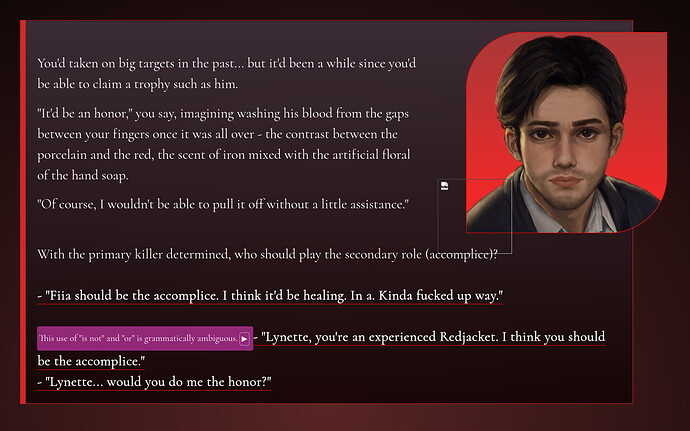Redjackets by Anna C. Webster
This is a choice-based game about a group of vampire hunters who are different from other vampire hunters – it’s a big business, apparently, with many active firms – in that they also recruit ‘good’ vampires into their ranks. How the business fits into broader society remains extremely vague.
Supposedly, we’re being paid to take down a big crime boss vampire. (The game even says: “But being an academic doesn’t exactly pay the bills. This, on the other hand, does.” Let me tell you from private experience that being an academic does pay the bills. But I digress.) However, we’re never told by whom we are being paid, and at other times the game seems to suggest that we’re just hunting the bad guy because he’s a criminal. But then why doesn’t the police take him on? If he resists arrest, you can always fire some silver bullets. What’s more, we’re told that we’ve been investigating this guy for years but that he’s very careful and that we can’t make our case against him without search warrants and/or inside information… but once we actually get an insider in our team, ‘making a case’ seems to have dropped off the radar and it’s immediately assassination time. But what is the justification for killing this crime boss? It can’t be that he’s a vampire, because (a) so are several of the player characters, and (b) he never bites unwilling people. So it must be that he is a crime boss. But extrajudicial killings of crime bosses are hard to morally justify, or so one hopes, and it’s unclear how the perpetrators of such a flagrantly criminal assassination could think of themselves in the glowing moral terms that the protagonists in fact do. None of it seems to make much sense, to be honest!
There are more points at which the story is fairly unlikely, some of which have been pointed out by other reviewers. I was most turned off by the climactic fight scene, in which the supposedly super strong, smart and careful crime boss allows himself to be isolated from his helpers, then stands still doing mostly nothing while some stuff happens and he is staked with a silver stake. It includes a bizarre moment when his henchman sneaks up on one of the player characters from behind and then gives them a knee in the stomach. I had a lot of trouble visualising any of this, and what should have been the climax of the story felt like anything but.
On the other hand, a fair amount of the smaller scenes are quite nice. There’s some nicely done understated romance; there’s fun shenanigans with other firms; there’s even the grading of essays on Slavic folklore… the piece feels more real and better thought out during the more mundane moment-to-moment writing, and this kept me engaged even as the bigger story failed to work for me.
Perhaps the most interesting thing about Redjackets is that you can play it from the perspectives of three different characters: the human vampire hunter, the vampire vampire hunter, and the young vampire who is caught and then decides to become a hunter herself. After playing with one character, you can then play with another while some of the choices you made are remembered. At first I assumed that the game would go full Rashomon mode on us, using the different viewpoint characters to tell incompatible stories. It does not. In fact, it doesn’t even really pursue the idea that people experience things differently, or notice or remember different things. The three characters are used to round out the story; there’s a lot of literally overlapping prose, but some scenes are unique to specific characters. I thought that was fine. I would have liked it more if the story itself had been deeper and more convincing, so that it would reward replay more; but as a gameplay mechanic, it has potential.
The writing is somewhat hit-and-miss. It works most of the time, but one frequently runs into paragraphs like this:
‘She’d saved each other’s lives’ is obviously a mistake, as is the word ‘once’; but I also don’t like the juxtaposition of ‘these days’ and ‘the days’. Or what about this:
This prose meanders without telling us anything, and it confuses more than it informs. But there’s also the occasional nice bit, such as this wonderful analogy:
There are a few bugs that are not confined to jars. I had problems with the pictures, seeing an unloaded picture icon some of the time. There are a fair amount of scenes where the second person and third person fail to be used correctly, because the programme is unaware which character we are currently playing. And when I played for the second time, Declan – who was the PC the first time and chose himself to be the killer, giving the other two roles to the others – was chosen to be both the killer and his own helper. Both the missing picture icon and another strange bug (which I’m almost tempted to believe must be caused by a grammar checking browser extension on my side… but I don’t think I have one, and the mentioned phrases don’t even occur on the page!) can be seen in the following screenshot:
So… I suppose I’ve been listing many bigger and smaller gripes. There’s a lot in Redjackets that doesn’t quite work, and of course the game suffers from that. But it is a sympathetic game made with obvious enthusiasm, and it contained enough little things that do work to ensure that I never lost patience with it.
